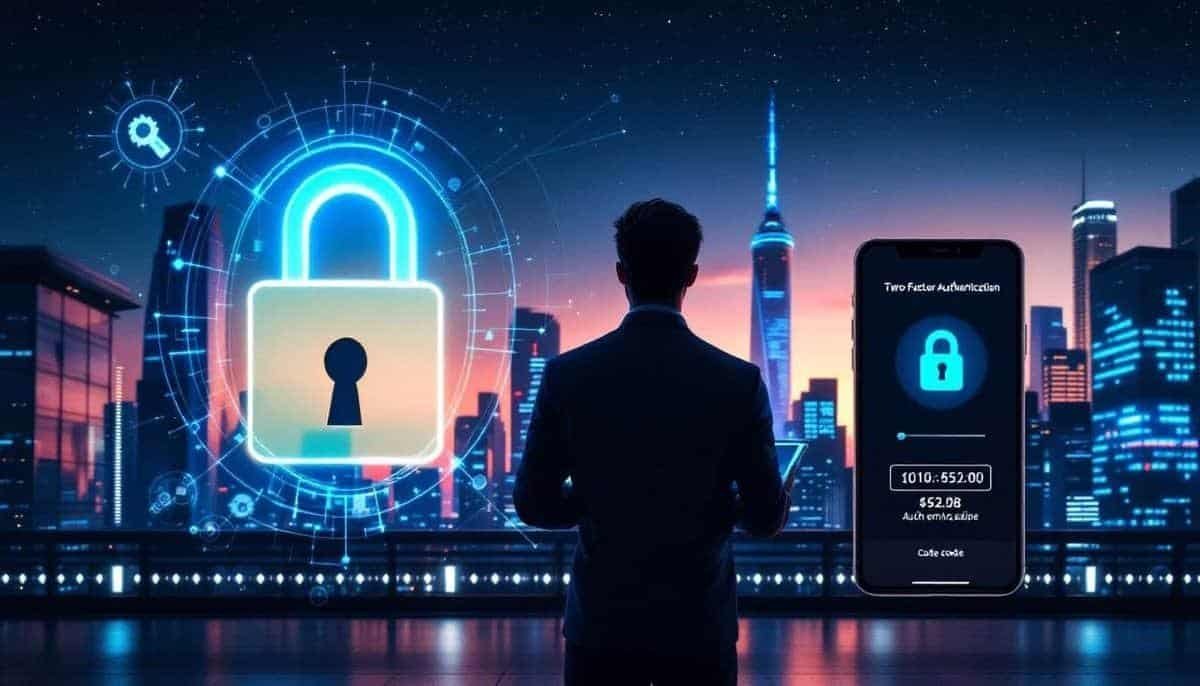Top Tips to Keep You Online Safe in 2025

We may earn a small fee from the companies mentioned in this post.
Worried about online safety? In this article, you’ll discover how to keep your online safe with practical tips on securing your personal data and devices.
Key Takeaways
Understanding the wide range of online risks, including identity theft, scams, and exposure to harmful content, is essential for maintaining safety in the digital world.
Implementing strong passwords, enabling two-factor authentication, and regularly updating devices are critical steps individuals should take to enhance their online security.
Parents and caregivers can utilise resources and open communication to support children in navigating online challenges, promoting a safer digital environment.
Understanding Online Risks

Navigating the online world can be daunting, especially for young people vulnerable to various risks. Common threats include identity theft, scams, and exposure to harmful content. Such threats may trick young individuals into clicking dangerous links or sharing personal information, leading to severe consequences.
The internet is rife with distressing material such as violence or hate speech, which young people may inadvertently encounter. Such exposure can have negative psychological effects, particularly when it involves violent or pornographic content. Research indicates that one in three young people have encountered disturbing content online, highlighting the issue’s prevalence.
It is also crucial to protect children from harmful content in YouTube videos, which can be a source of online abuse and grooming. Ensuring that users accept cookies to view these videos can help in monitoring and controlling the content they access.
These combined risks significantly impact the safety and wellbeing of young people in the digital environment. The constant exposure to harmful content and the ever-present threat of scams or identity theft can lead to anxiety, stress, and a sense of vulnerability. Recognizing these risks is the initial step towards a safer online space.
Essential Cyber Security Awareness Training Topics for 2024
Essential Tips for Staying Safe Online

As a family, maintaining online safety is crucial in today’s digital world. Enhance online safety by keeping personal information private, using strong passwords, enabling two-factor authentication, and staying aware of scams.
Following these top tips will shield you and your loved ones from various online threats and help you stay safe online.
Creating Strong Passwords
Creating strong passwords is an effective way to stay secure online. A strong password should be at least 12 characters long and include a mix of letters, numbers, and symbols. Avoid using easily guessed words or phrases that could be found in a dictionary. Using a unique and strong password for each of your accounts can significantly enhance your online security.
Particularly important is the password for your email account, as it often serves as a gateway to other personal information. Using a unique and strong email password protects you from identity theft and other threats.
Password managers can be helpful tools for managing your passwords, although a password manager comes with its own set of considerations.
Enabling Two-Factor Authentication
Two-factor authentication (2FA) is an additional layer of security that can significantly enhance the protection of your online accounts. By requiring users to provide an additional piece of information, such as a code sent to their phone, 2FA makes it much more difficult for unauthorized individuals to gain access, even if they have your password.
Adding 2FA to your accounts provides extra security, reducing the risk of unauthorized access. This method is effective because it requires both something you know (your password) and something you have (a code sent to your phone), making it harder for hackers to access your accounts.
Keeping Devices and Apps Updated
Regularly updating your devices and app updates is crucial for online safety. Tech companies regularly release updates that include essential security patches to defend against new cyber threats. Regular updates protect your devices against the latest vulnerabilities.
Regular updates are not just about new features; they are critical for security. Updates often include security fixes that shield your devices and personal information from cyber threats. Staying up-to-date with the latest technology and updates is a simple yet effective way to keep your online environment secure.
Protecting Personal Information Online

Safeguarding your personal information is vital for online safety. Enhance your online security by using unique passwords for each account and staying vigilant against fraud and phishing scams.
These scams often trick individuals into disclosing personal data or downloading harmful software, leading to identity theft and other security breaches. Implementing these strategies will help protect your personal information and keep you safe online.
Recognizing Phishing Scams
Phishing scams are fraudulent attempts to obtain sensitive information by disguising as trustworthy entities. Criminals frequently impersonate trusted organizations to deceive individuals into providing sensitive information, such as passwords or credit card numbers.
To avoid phishing scams, verify the source of any unsolicited requests for sensitive information. Be cautious of emails or messages that ask for personal details and always double-check the authenticity of the sender before responding.
Managing Privacy Settings
Adjusting your privacy settings on social media platforms minimizes exposure to cyber threats. By adjusting these settings, you can control who has access to your personal information and reduce the risk of unauthorized access.
Reviewing and adjusting your privacy settings lets you control who can view your information and posts, offering extra protection against potential threats.
Resources for Parents and Carers

Parents and carers have numerous resources available to help protect children online. The NSPCC provides a variety of resources and guidance for families to navigate online challenges and prevent abuse.
It is important to accept targeting cookies to view specific online content, such as YouTube videos, as this enhances user experience and underscores the importance of online safety and data privacy in relation to children’s content.
Their website offers comprehensive advice on online safety, covering social media, parental controls, and harmful content.
Parental Controls and Monitoring Tools
The NSPCC’s online safety hub provides detailed guidance on parental controls and managing children’s online interactions. Parents can use tools like Report Remove to help their children report instances of online abuse or concerning content.
Reporting tools provided by the NSPCC allow young individuals to safely report harmful content they encounter online. Highlighting the importance of reporting online abuse helps protect children and provides necessary support.
Talking to Children About Online Safety
Creating a safe environment for children to share their experiences encourages open communication about online safety. Parents and carers can access resources providing guidance on protecting children online.
Using parental controls and monitoring tools helps parents track their children’s online activities and ensure their safety. These measures, along with open dialogue, foster a secure online environment for children.
Supporting Young People

Supporting young people in their online activities is vital for their safety and wellbeing. Issues like cyberbullying, online grooming, and sexting can have long-lasting repercussions in young people’s lives.
Organizations like Childline provide confidential support for children and young people needing advice on online safety.
Reporting Online Abuse
The Report Remove tool, developed by NSPCC and the Internet Watch Foundation, allows individuals under 18 to report shared nude images. This tool is essential for ensuring online safety and protecting vulnerable individuals from harm.
Encouraging the use of reporting tools like Report Remove can help create a safer online environment for all users. Reporting online abuse is essential for maintaining a safe online space.
Encouraging Open Communication
NSPCC emphasises the importance of open dialogue between parents and children regarding their online experiences and safety. An environment of trust encourages children to openly discuss their online experiences.
Open dialogue with children about online experiences can significantly alleviate their worries. Letting children know you’re listening is crucial for their safety, helping children feel more secure.
Spotting Fake News and Misinformation
Distinguishing real news from fake news can be challenging in today’s digital age. Some websites that report fake news aim to scare you, influence your actions, or earn money from increased site visits.
Adjusting privacy settings on social media can significantly reduce exposure to phishing attacks and misinformation. Awareness of these tactics helps you navigate the online world more safely.
Free Online Safety Resources
Many free online safety resources are available to protect you and your loved ones from online threats. Tools like Report Remove are designed to assist individuals under 18 in requesting the removal of their nude or sexual images shared online.
The online safety reading list covers topics like cyberbullying, social media, online mental health, and wellbeing. Using these free resources is crucial for enhancing your personal protection against online threats.
Summary
In summary, staying safe online involves a combination of awareness, proactive measures, and utilizing available resources. By understanding online risks, creating strong passwords, enabling two-factor authentication, keeping devices updated, and protecting personal information, you can significantly enhance your online safety. Remember, a safe online environment starts with informed choices and open communication.
Frequently Asked Questions
What are some common online risks for young people?
Common online risks for young people include identity theft, scams, and exposure to harmful content like violence and hate speech. It is important for young individuals to be aware of these risks to protect themselves effectively.
How can I create a strong password?
To create a strong password, ensure it is at least 12 characters long and combines upper and lower case letters, numbers, and symbols. Avoid using easily guessed words or phrases to enhance security.
What is two-factor authentication, and why is it important?
Two-factor authentication enhances security by requiring a second piece of information, like a code sent to your phone, making unauthorized access significantly more difficult. It is crucial for protecting sensitive information from cyber threats.
How can parents protect their children online?
To effectively protect their children online, parents should utilize parental controls and monitoring tools while fostering open communication about online safety. This proactive approach significantly enhances children’s security in the digital space.
What should I do if I encounter fake news?
If you encounter fake news, it is essential to be skeptical and verify the information using reliable sources. Adjusting your privacy settings on social media can further minimize your exposure to misinformation.
Useful External References
- Action Fraud
- Website: actionfraud.police.uk
- Description: Action Fraud is the UK’s national reporting center for fraud and cybercrime. It provides valuable information on various types of scams, including those on social media.
- The National Cyber Security Centre (NCSC)
- Website: ncsc.gov.uk
- Description: NCSC is a part of GCHQ and provides comprehensive advice on cybersecurity, including how to protect yourself from social media scams.
With over three decades of experience in the heart of London’s financial sector, I have dedicated my career to the pursuit of robust cybersecurity practices and IT leadership. As a Certified Information Systems Security Professional (CISSP), Certified Information Security Manager (CISM), Certified Chief Information Security Officer (C|CISO), Certified Ethical Hacker (CEH), and Computer Hacking Forensic Investigator (CHFI), I bring a wealth of knowledge and expertise to the table.
My journey in the field of cybersecurity has not only been about personal growth but also about sharing my insights with others. As an international speaker, I have had the privilege of addressing audiences worldwide, discussing the importance of cybersecurity in today’s digital age. My passion for knowledge sharing extends to my work as an author and blogger, where I delve into the complexities of cybersecurity, offering practical advice and thought leadership.
In my role as a CISO and Head of IT, I have overseen the development and implementation of comprehensive information security and IT strategies. My focus has always been on creating resilient systems capable of withstanding the evolving landscape of cyber threats.
My Master’s degree in Cybersecurity has provided a solid academic foundation, which, when combined with my practical experience, allows me to approach cybersecurity from a holistic perspective.
I am always open to connecting with other professionals in the field, sharing knowledge, and exploring new opportunities. Let’s secure the digital world together.

